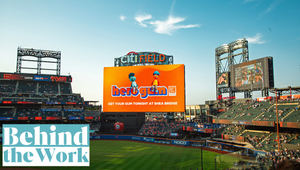
Inside Moonvalley's $84 Million Ambition for “Production Grade” AI Video

Could the promises and reality of AI video be closer than we realise? AI research company Moonvalley reckons that a new injection of $84 million in funding will accelerate the development of a generative videography platform free from the legal and ethical concerns that have beset other AI video tools.
Naeem Talukdar, Moonvalley CEO and co-founder, tells LBB that the funding accelerates the company’s ability to make creators’ AI dreams a reality and execute at scale. “We’re moving from proving what’s possible to delivering what filmmakers actually need,” he says. Specifically, that means that Moonvalley is expanding its licensed content library to leverage more diverse training data, building out API access so studios and brands can integrate Marey, Moonvalley’s foundational AI model, directly into their existing pipelines, and developing more advanced control features that its partners have been requesting. Moonvalley is also scaling its engineering and support teams to handle enterprise deployments, enabling it to build a tool that “works reliably in production,” says Naeem.
Moonvalley’s platform Marey is built on licensed content and the team claim that it will create ‘production grade’ video. The new round of funding secured $84 million, bringing Moonvalley’s total funding to $154 million. The round was led by existing investor General Catalyst and includes backing from Creative Artists Agency (CAA), CoreWeave, and Comcast Ventures. Existing investors Khosla Ventures and YCombinator also participated.
The raise reflects growing industry appetite for ethically sourced AI tools, particularly among enterprises and entertainment companies seeking to uphold intellectual property rights. Rather than relying on scraped or unlicensed material, Moonvalley’s approach centres on training its AI models exclusively on licensed data. Moonvalley is billing Marey, which was recently released to the public, as the ‘world’s first production-grade AI generative videography platform built for professional filmmakers and visionary brands’.
Naeem says this means two things for filmmakers and studios: legal confidence and professional control. “On the legal side, every frame Marey generates is clear for commercial use because we trained exclusively on licensed content,” he says. “No copyright concerns, no surprise claims – studios can use outputs in theatrical releases, broadcast campaigns, or any commercial project without legal review bottlenecks.”
In the official announcement of the funding deal, Moonvalley claims that the AI video its platform will produce will be ‘production grade’, a phrase that is sure to perk the ears or raise the hackles of filmmakers. It’s a description that Naeem uses very deliberately. “Marey gives filmmakers the precise control they expect from professional tools,” says Naeem. “You can draw motion paths to direct how objects move, control camera movements like you would on set, transfer motion from reference footage, and adjust performances frame by frame.” These aren’t AI gimmicks, adds Naeem. “They’re the controls filmmakers use every day, translated into generative workflows. When a director wants to adjust an actor’s expression or change a camera angle, they can do it directly, not through trial-and-error prompting.”
Training on licensed content “fundamentally changes both the creative process and output quality,” says Naeem. “First, our licensed content is all native 1080p footage: no upscaled YouTube clips or compressed social media videos. This high-resolution training data means Marey produces sharper frames with fewer artifacts and more stable motion throughout a clip.”
“More importantly,” he adds, “because we’re not training on scraped artistic works, Marey doesn’t inadvertently reproduce existing styles or visual signatures. The model responds purely to your creative direction rather than defaulting to patterns it learned from other artists’ work. This gives filmmakers true authorship.”
The technical challenge to achieve this was “significant”. Moonvalley had less data volume than companies that scrape the internet, so it had to build better architecture to achieve comparable quality. “But the result is a model that’s both legally clean and creatively neutral, giving filmmakers a blank canvas rather than a pre-painted one,” says Naeem.
What’s more, Naeem believes that its approach of using only licensed content to train Moonvalley’s models has “already changed the conversation” around AI ethics and copyright. “Before Marey, companies claimed you couldn’t build competitive AI without scraping content. We proved that’s false,” he says. “The recent lawsuits from Disney and Universal against companies using unlicensed training data show where the industry is headed. Studios won’t adopt tools with legal uncertainty, and creators won’t embrace technology that exploits their work. We’re not just meeting current standards, we’re establishing what professional AI tools must be: powerful, precise, and built on a foundation that respects creative rights.”
What excites Naeem most is how, in his opinion, this approach enables genuine partnership with creators. “When filmmakers know their work won’t be scraped for training, they’re willing to collaborate on building better tools. That collaboration is what makes Marey different – it’s built with filmmakers, not despite them.” Moonvalley collaborates with its in-house filmmaking division, Asteria – led by Bryn Mooser – to tailor tools for cinematic use, prioritising quality, creative control and commercially viable outputs.
Moonvalley’s new investors emphasised their alignment with Moonvalley’s ethical approach and technical ambition. “We have the exciting opportunity to strategically partner with companies like Moonvalley, who are developing breakthrough advancements in media and technology,” said Allison Goldberg, managing partner of Comcast Ventures. “Moonvalley’s approach to generative videography combining technical excellence with respect for content creators aligns with how we think about innovation in our industry.”
Alexandra Shannon, head of strategic development at CAA, echoed this sentiment. “Ethically led and talent-friendly applications of AI are a top priority for CAA. We see an opportunity with these emerging tools and technologies, and having a set of partners who are aligned in the ethics behind AI is critical,” she said. “Moonvalley understands that AI should empower artists, not undermine them, and we are excited to help bring this new technology to our clients and the entertainment community at large.”
Brannin McBee, co-founder and chief development officer at CoreWeave, highlighted the infrastructure partnership behind Moonvalley’s growth. “CoreWeave is proud to support Moonvalley as demand accelerates for foundational AI video models and tools,” he said. “Our relationship provides Moonvalley with access to advanced compute resources – including the latest GPU systems. Our infrastructure helps Moonvalley scale its commercially safe model to meet growing demand from studios and enterprises seeking powerful, legally compliant AI video solutions.”
With Marey now accessible via Moonvalley.com, the new capital will support scaling efforts to meet enterprise demand. The company’s roadmap includes expanding its licensed content library, developing API access for third-party developers, and enhancing features for studios and enterprise clients. Moonvalley is also growing its engineering and support teams to enable larger-scale deployments.
“Our vision is to make generative video as essential to filmmaking as digital cameras or visual effects: a core tool that expands what’s creatively and economically possible,” says Naeem. “We see a future where every production, from indie films to studio blockbusters, uses AI to iterate faster, explore more options, and achieve shots that would be impossible or prohibitively expensive otherwise.”
“Marey’s launch proved the foundation is solid. Now we’re focused on integration – getting our tools into actual production pipelines through API access, plugins for editing software, and features that work with how filmmakers already work. We’re also expanding what’s possible.”
The real measure of success for Naeem and the wider Moonvalley team isn’t just adoption, he adds. “It’s when filmmakers stop thinking of AI as a separate category and start seeing it as another camera, another lens, another way to tell their story.
“Based on the response from studios and the partnerships we’re building, we’re closer to that reality than most people realise.”















